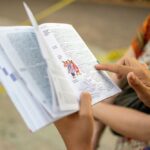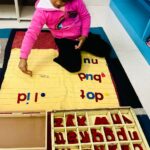
The Power of Autonomy…
No! I did it! I want the blue dress! We all must have seen ‘toddlers’ showing such kind of Independence, to exhibit authority in their own little world.
Developmental Psychologist, Erik Erikson (1950), had identified the period from 18 months-3 years as the second stage in personality development, ‘autonomy v/s shame and doubt’, which is marked by a shift from external control to self- control. Toddlers feel impelled to find out that they are individuals, that they have some control over their world and ‘Yes’ they have new and exciting powers. At this point of time, children begin to try out their own ideas, make decisions even when their cognitive and physical skills are not adult like.
Some of the best Montessori schools in Kolkata believe, “every child is unique”, giving them the right environment to learn and develop will not only help them achieve autonomy but also make them responsible individuals. In reality, this concept is catered by very few Montessori schools in Kolkata. As children learn to be autonomous, they naturally grow up to be independent adults by picking up skills they learn during their childhood.
Why value Autonomy during Toddlerhood!
Autonomy simply means ‘self-governance’. In other words, freedom of choice, freedom from external control and most importantly independence. It’s natural to be over-protective as parents, but at the same time you got to ‘take that risk’ and allow your child to experiment in order to achieve independence and self-control. As adults, we need to set appropriate limits and help them recognize the need for these limits. Since, unlimited freedom is neither safe nor healthy.
Toddlers are always curious to learn new things and their brain acts like a ‘sponge’ absorbing anything and everything they see, hear around them. They slowly learn that every action has an opposite reaction and hence their curiosity intensifies at this stage. We, might just shout at our child “if they throw a cup on the floor or spill water from the jug”, but we must not forget that ‘they too are learning from their experience’.
Here are some Tips to foster Autonomy among Toddlers: –
- Be a role model:
 As parents and caregivers, we can set examples for our little one’s by performing the task first. Thereafter, allowing them to repeat it. For example, pouring water in a bottle, keeping back books on the shelf, tying a shoe-lace, opening and closing a lock, applying butter on bread, opening and closing buttons etc. Children always look for opportunities to learn new things and the best way is to allow them to do it on their own!
As parents and caregivers, we can set examples for our little one’s by performing the task first. Thereafter, allowing them to repeat it. For example, pouring water in a bottle, keeping back books on the shelf, tying a shoe-lace, opening and closing a lock, applying butter on bread, opening and closing buttons etc. Children always look for opportunities to learn new things and the best way is to allow them to do it on their own!
- Give them Choices:
 Unlimited freedom of choice should never be the solution. As an adult when we give toddlers a choice, we are indirectly giving them the power to choose, make a decision and hence improving on their cognitive skills. For example, simply asking “which snack do you want to eat? Which book do you prefer? Which dress will you wear etc.? As Maria Montessori, had correctly pointed out giving “freedom within limits” is the key for all around development of the child.
Unlimited freedom of choice should never be the solution. As an adult when we give toddlers a choice, we are indirectly giving them the power to choose, make a decision and hence improving on their cognitive skills. For example, simply asking “which snack do you want to eat? Which book do you prefer? Which dress will you wear etc.? As Maria Montessori, had correctly pointed out giving “freedom within limits” is the key for all around development of the child.
- Assign Tasks: Just like adults, children also like to be appreciated. Assigning simple tasks daily can boost their confidence and at the same time make them feel accepted, valued and loved. For example, mixing the cake batter, watering the plants, folding the napkins, putting back plates after dinner, cleaning up toys etc. At the end of the task, toddlers will feel proud and accomplished for their hard work.
- Toilet Training:
 This is one of the most important steps towards achieving autonomy and self-control during toddlerhood. Parents, caregivers should assist the child to the toilet and teach them ‘how to sit on the toilet seat’ (should be child size), how to wash hands etc. Toddlers as young as 18 months begin to show gestures if they want to use the toilet, as parents we need to look for such signs. Encouraging them to use the toilet often and asking appropriate questions is needed. Also, do not forget to praise them after doing a great job.
This is one of the most important steps towards achieving autonomy and self-control during toddlerhood. Parents, caregivers should assist the child to the toilet and teach them ‘how to sit on the toilet seat’ (should be child size), how to wash hands etc. Toddlers as young as 18 months begin to show gestures if they want to use the toilet, as parents we need to look for such signs. Encouraging them to use the toilet often and asking appropriate questions is needed. Also, do not forget to praise them after doing a great job.
- Create Opportunities: If your child is fond of ‘books’, then make the book shelf easily accessible to him/her. Children are great observers; they learn through observation so encourage them to work more. As they work, their senses and motor skills enhance which is essential for normal growth and development of the child. Guide them to put back toys, crockeries, brushing teeth twice daily, using the dustbin to throw litter, using soap while bathing, peeling the skin of fruits before eating, teach them table manners. All these tasks will help them achieve confidence, build their self-esteem and thereby achieve autonomy.
“Any child who is self-sufficient, who can tie his shoes, dress or undress himself, reflects in his joy and sense of achievement the image of human dignity, which is derived from a sense of independence”
-Maria Montessori-
Researchers have pointed out ‘autonomy’ as a crucial skill in human development. The journey towards achieving autonomy may have several loop holes, but as adults it’s our duty to help the little ones. The more we foster skills of independence, we are actually helping them create a sense of mastery over their body, mind and environment. Giving your child opportunities, will make them feel, Capable!













It’s a wonderful reminder to all of us. If we as an adult enjoy the freedom of doing things independently, why not the kids.
Very helpful information and well constructed. Thanks for sharing. Looking forward to reading similar content in the future. Thanks.